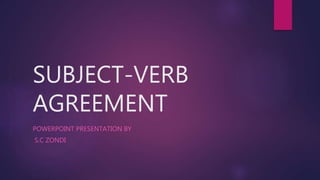Subject verb agreement
- 2. Subject vs verb A word used to describe an action, state, or occurrence, and forming the main part of the predicate of a sentence, such as hear,became,happen. Pronoun that is used as the subject of a verb. In English the subject pronouns are I, you, he, she, it, we, they, what, and who.
- 3. RULES ON SUBJECT-VERB AGREEMENT Rule 1: ï Basic Principle if the subject doesnât end in âS, the verb will. If the subject does end in âS, the verb wonât
- 4. ïĩ The girl dances -S on the verb No -S on the subject
- 5. Rule 2 ï The indefinite pronouns anyone, everyone, someone, no one, nobody are always singular and, therefore, require singular verbs. ïĩ Everyone has done the homework. ïĩ Somebody has left her money on the table.
- 6. Rule 3 ï In informal writing, neither and either sometimes take a plural verb when these pronouns are followed by a prepositional phrase beginning with of. This is particularly true of interrogative constructions ïĩ Have either of you two clowns read the assignment? ïĩ Are either of you taking this seriously?
- 7. Rule 4 ï Phrases such as together with, as well as, and along with are not the same as and. The phrase introduced by as well as or along with will modify the earlier word (mayor in this case), but it does not compound the subjects (as the word and would do). ïĩ The mayor as well as his brothers is going to prison. ïĩ The mayor and his brothers are going to jail.
- 8. Rule 5 Rule 5: ï The pronouns neither and either are singular and require singular verbs even though they seem to be referring, in a sense, to two things. ïĩ Neither of the two traffic lights is working. ïĩ Which shoes do you want for Christmas? Either is fine with me.
- 9. Every verb must agree with its subject Singular subject Singular verb Plural verb Plural subject
- 10. PREPOSITION? It is a word placed before an object to specify its location. Letâs Practice:
- 11. Thank you
- 12. Reference Doofenshmirtz , H . (2014) VERB AND SUBJECT AGREEMENT ïĩ /gwapakoanasimama/subjectverb-agreement-with-prepositional-phrase?qid=6c7dfb60-605e-434e-963a- b7a7dd44bf66&v=&b=&from_search=6 Draizelle Sexon (2012), Professor at Pasig Catholic College ïĩ /draizelle_sexon/subject-verb-agreement-14050826 John Kier Aquino, (2014) LPT, Registrar, Guidance Counsellor and English Teacher at Palm Crest International School ïĩ /jankyerakino/rules-in-subject-verb-agreement Corey Topf (2009), Teacher ïĩ /mrtopf11/s-v-agreementppt-presentation Yupawadee Thongkham (2014), Teacher ïĩ /yupawadeethongkham/subject-verb-agreement-36631074?qid=18a1587e-95d5-4cc4-aec4-b46a950e7219&v=&b=&from_search=4
- 13. Class work Letâs Practice: ïĩ She (talk, talks) quietly. ïĩ They (read, reads) their assigned books. ïĩ Sam (go, goes) to the coffee shop every weekend. ïĩ We (write, writes) letters for our friend abroad.













